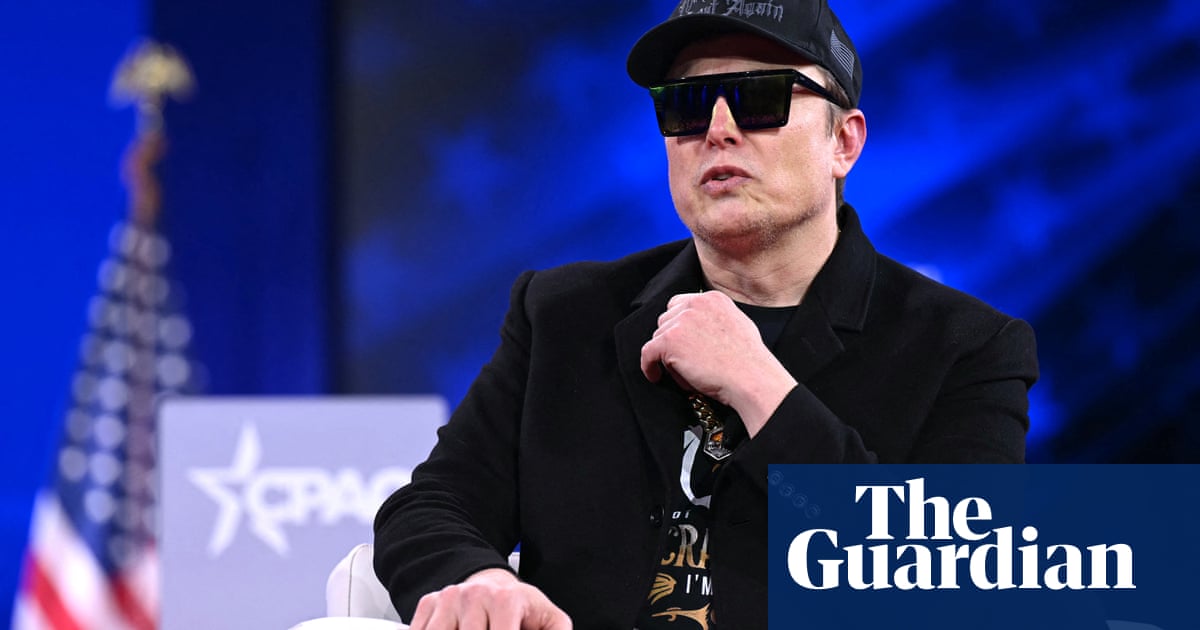Miliaku Nwabueze, a senior program manager at Code for Science & Society, had been concerned for some time about the role of technology in state violence. Then, on 7 October of last year, Hamas entered Israel, killing and kidnapping about 1,400 people. Less than a week later, as Israel ordered 1.1 million Palestinians out of northern Gaza in the onset of its deadly retaliation, Nwabueze decided to write a message to her colleagues on the US-based non-profit organization’s Slack channel.
“Hey y’all … I have been watching multiple genocides around the world,” she began, naming Palestine as well as Sudan, the Congo and Artsakh. “All of these have heavy linkages to the tech industry.” The 30-year-old went on to assert that CS&S – whose stated mission is to “advance the power of data to improve the social and economic lives of all people” – should say, at the minimum, “we support demands for a ceasefire” in Gaza.
“Can this be a topic of discussion at our next All-Hands meeting?” she asked.
Six members of the organization’s core staff of 12 agreed, using the “100 [percent]” emoji.
Nwabueze did not anticipate that her one-paragraph Slack message would set in motion a series of escalating events that would tear the organization apart, with nearly all core staff members resigning and two being fired – including, in September of this year, Nwabueze herself.
The central issue: the organization’s board and executive director opposed a statement that staff wrote about Israel’s continuing assault on Gaza and tech’s role there and elsewhere, citing concerns such as “fiduciary responsibility”. The events propelled by the statement mirror others happening across US society since October of last year, in areas such as academia, media and big tech, where criticism of Israel from the rank-and-file comes under fire from leadership.
What happened at CS&S is important, several observers told the Guardian, because of the organization’s high profile within the area of public interest tech, a small, relatively new field with nominally progressive aims. CS&S provides what’s known as “comprehensive fiscal sponsorship” for about 15 tech projects, who in turn get their funding from heavy hitters such as the Ford and MacArthur foundations and George Soros’s Open Society Foundations. As a comprehensive fiscal sponsor, CS&S uses its non-profit status to manage the projects’ grants and donations, as well as providing services such as human resources and strategic advising, so the projects can focus on their missions. In exchange, the projects pay 15% of their funds to CS&S, which operates with its own $20m budget.

While the staff of the fiscally sponsored projects are on CS&S’s payroll, they are not CS&S core staff and don’t participate in the organization’s day-to-day operations or help shape its future – only core staff helps create the organization’s strategic plan, for example. One core staffer described the role she and her colleagues played as being the “voice” of the organization.
Until the fallout from the statement, the most high-profile name under CS&S’s fiscal sponsorship umbrella was Timnit Gebru. A pioneer in researching ethics in AI, Gebru raised the organization’s profile when she came under its sponsorship in 2021. Google had fired her in 2020 after she raised issues of discrimination in the workplace. She brought nearly $4m in grant funding to the organization, for a project she started called the Distributed Artificial Intelligence Research Institute (Dair).
Gebru served on the organization’s board as well – until she resigned in protest over its handling of the statement.
The events at CS&S are an example, according to Paul Biggar, of the label “progressive except for Palestine”. Biggar was dismissed from the board of CircleCI, a company he founded, after writing a blogpost in December about Israel’s bombardment of Gaza titled “I can’t sleep”. He went on to found Tech for Palestine, a coalition of tech professionals volunteering to help projects “in support of a free Palestine”.
The Guardian has learned of the events detailed in this story through interviews with six former staffers and one former board member at the organization, and has obtained dozens of Slack and email messages between staff, the executive director and senior director of operations, and board members. Most of the former employees requested anonymity in sharing details of these events.
Last fall, hours after colleagues expressed emoji approval of Nwabueze’s request to bring the subject of genocide and tech to an all-hands meeting, CS&S’s executive director, Danielle Robinson, posted a reply. She addressed Nwabueze’s idea of the organization issuing a statement.
“I am […] very cynical […] about the power and utility of organizational statements,” Robinson wrote. “My position is that our organization should not put out statements on specific wars and geopolitical conflicts,” she continued.
Nwabueze drily replied: “I was referencing genocides, not war or conflict.”
Things went downhill from there. Robinson said Nwabueze’s reply was “loaded with assumptions about what I believe”. Nwabueze asked: “What is it exactly that you are assuming that I’m assuming?”
Despite this wobbly beginning, the core staff began working on a process for creating and voting on a statement, followed by collaboratively writing the statement itself over the course of several weeks. Robinson communicated online that she was “not going to try to slow or otherwise interrupt this work”.
The four-page, 1,291-word statement began like this: “The workers of Code for Science & Society invite our partners, present, past, and future, to imagine coalition towards a world without genocide.” It continued: “We are joining those demanding a ceasefire in Gaza, an end to the Zionist Occupation.”
The document cataloged the rise in recent years of “militarized technology” used for state repression, including Israel’s use of AI in facial recognition technology in Gaza, China’s use of similar tech against Uyghurs, and “‘smart’ weapons” used in Sudan. It addressed the US state of Georgia’s attempts to limit open source technology used by the movement against “Cop City”, a controversial police training center in Atlanta. “The roots of modern fascism sit in the oppressive systems of colonialism, marked by the atrocities of racism and white supremacy,” wrote the staffers.
The statement also acknowledged pushback that could result from publicly addressing these issues head on: “In our offices, labs, and workplaces, we note the renewed de-platforming of people and institutions who stand with Palestine.”
It concluded: “As workers at a 501(c)(3) organization that claims to build a ‘better’, ‘freer’, ‘equitable’, ‘just’, or ‘liberated’ world, we believe we have a duty to speak out against the genocides happening globally, and the repression happening stateside in Atlanta.”
By 28 November, core staff had voted on the document, with 10 in favor, one opposing and one abstaining. Two days later, on 30 November, they sent an email to the organization’s board of directors and the 15 or so projects that the organization fiscally sponsors, informing them of plans to release the statement the following day – on CS&S’s X and LinkedIn accounts, and its blog.
At some point that afternoon, Robinson called several senior staffers to tell them the board was “freaking out” and had “read her the Riot Act”, according to people with knowledge of the call. “The board is concerned about their fiduciary responsibility,” Robinson told them. She wanted to make sure the statement could be stopped from automatically posting the following day. “If we stop it now, it’s never gonna go out,” a staffer on the call said.

“It was a messy situation,” one person with knowledge of the call told the Guardian.
In a response to questions from the Guardian, Robinson said via email that any statement would have repercussions for the projects that CS&S sponsored. “CS&S can’t speak on behalf of all of the fiscally sponsored projects, and it would be inappropriate for us to set that precedent. [The statement] also made programmatic commitments that we were not in the position to make and did not align with our core purpose of supporting fiscally sponsored projects,” she said.
Shortly before 11pm on 30 November, the then senior director of operations, Joe Hand, and two other senior staffers, all of whom had worked on the statement, sent an email to the rest of the core staff explaining that the board had expressed “significant concerns with their ability to uphold their fiduciary and governance responsibilities without sufficient time to assess the statement’s impact”.
“Their request,” Hand wrote, “is to pause the release of a public statement until we’re able to meet. […] We’re sharing this update with you with extreme disappointment, and want to remain optimistic that there is a path forward that strengthens our relationship with the board while also releasing the statement we co-authored.”
On 4 December, staff and board members met on Zoom. Rayya El Zein, director of partnerships at the organization, was one of 16 who attended. “As [the] only Arab, Muslim Palestinian on the team – an attempt to block the statement will be silencing solidarity with perspectives that are not typically heard in this space,” she asserted, according to minutes from the meeting. “Silencing concerns of women of color – this is a real risk for CS&S,” she added. Born in the US, El Zein is of Palestinian and Lebanese heritage.
Most of the meeting consisted of board members, including Gebru, asking staffers to explain the process they used for writing and voting on the statement, and how they saw the statement aligning with CS&S’s mission. “From a board perspective, we are also disgusted by what’s happening,” said one board member, referring to Israel and Gaza. “We are also looking at CS&S and its responsibility as a fiscal sponsor,” she added.
This was a form of “gaslighting”, El Zein told the Guardian. “The board said, ‘It’s not about Palestine; we’re concerned about our fiduciary responsibility,’” she said. “It’s like a playbook,” she added.
A staffer explained to the board that the document was meant to be “[l]ess of a statement and more of an invitation for discussion” – the hope was to create opportunities for organizing with others in public interest tech against the use of tech for state violence. Nwabueze echoed this point, noting that the “idea was that this is not just internal to CS&S, but [to] folks from our sector”.
Still, the “path forward” Hand hoped for in his email never emerged. Less than two weeks later, on 10 December, the board communicated its decision: staff was free to “release the statement on a third-party channel” – meaning, on their own social media or other online accounts, but not on behalf of the organization. This was unacceptable to everyone who had participated in the effort, said Nwabueze: “The point was to have the weight of the organization behind the statement.” Another staffer said the decision “defeated the whole purpose of the effort”.
The board’s response was “disappointing” to Elliot Colbert, then senior operations manager. “Simply put, there was a dissonance – we are an organization that works toward a social mission; then we’re put in a position where we’re not able to make a statement to that effect,” she said. Colbert left CS&S on 3 July.
Nwabueze called the board’s decision “an emotional response to not wanting to call this” – meaning Israel’s assault on Gaza – “a genocide”.
The dispute over the statement wasn’t the first sign of tension in the organization.
Before 7 October, CS&S was already months into conflict over what staffers of color felt was racist leadership. Several staffers told the Guardian that the organization hired Black employees but didn’t give them agency to make important decisions.
The organization’s board led an investigation into the racism claims earlier this year. It reached its conclusion in March: Robinson was largely cleared but might have acted contrary to CS&S’s “values”, according to an email to core staff from the board chair, Kari L Jordan. (Jordan declined to comment.)

“When allegations of racism came up, the board took this very seriously. They immediately retained an independent, outside law firm to conduct an investigation. The investigation concluded in early 2024 and found no evidence of racism or behavior that violated anti-discrimination law or organizational policy,” said Robinson.
In April of this year, the board hired a consultant to perform an “organizational assessment” and help mediate the conflict over the racism allegations. Several staffers told the Guardian they had asked to participate in selecting the consultant and were assured they would get a chance to do so. Instead, on 15 April, the board surprised staff with an announcement that it had chosen a firm called TH Easter. Staff refused to schedule one-on-one interviews with the consultant.
Robinson said the board solicited and evaluated suggestions for consultants from the core staff before deciding to hire TH Easter.
While the allegations of racism had caused internal tension for months, ultimately what happened at CS&S after 7 October owed to fallout over the statement, staffers told the Guardian. It was “clearly the catalyst for the [organization’s] unraveling”, said Colbert.
On 13 May, Gebru resigned from the board over the statement being squashed. “I didn’t agree with the course of action the board was taking,” she told the Guardian. “I couldn’t change it; the only thing I could do was make sure my name was not attached to it.”
The week of 3 June, TH Easter, the consultant, sent emails to core staff with an ultimatum: “commit to working towards an improved organization” and participate in the organizational assessment, or take a severance offer, according to a timeline of events one staffer shared with the Guardian.
On 8 June, Robinson fired Hand, the senior director of operations who had supported staff in their effort to release the statement. “I was fired because I didn’t agree with the executive director regarding the statement, or with her ability to lead the organization in general – which was present before and after the statement,” Hand told the Guardian. He shared part of the dismissal letter, which said that it was “clear from your communications and actions that your relationship with the Executive Director is irreparable”.
Several staffers said Hand’s dismissal was the last straw, a sign that things were likely to get worse. Most took the severance. Nwabueze stayed on for several months, in part to try to negotiate a better severance package. On 10 September, Robinson sent Nwabueze an email informing her she was fired. The executive director attributed the decision to Nwabueze receiving a full-time fellowship that would not allow her to also fulfill her full-time duties at CS&S. Nwabueze told the Guardian that her fellowship did not prohibit her from working full-time at CS&S.
The pushback from the board, the resignations, the firing and months of chaos at CS&S did not go unnoticed elsewhere. “With Code for Science & Society, we all expected better,” said Esra’a Al Shafei. “They’re supposed to be about social justice.”
Al Shafei is the founder of Majal, a project that describes itself as “working towards social justice in Southwest Asia and North Africa by developing safe and accessible digital spaces”. She also recently launched Surveillance Watch, an interactive map and database showing the connections between surveillance companies and their financial backers.
The digital activist said that events at CS&S were “not just impacting themselves, but the entire ecosystem of tech and social justice organizations”. Al Shafei spoke to the Guardian in late August, shortly after the announcement of Surveillance Watch. If things had been different, she said, she would have partnered with Gebru, whom she knows, and raised funds to continue developing the project under the fiscal sponsorship of CS&S.
The non-profit “supported good organizations that do really good things – that’s what’s so shocking”, she said.
Al Shafei, who is from Bahrain and never shows her face online to protect her own security, said “there is credible evidence that this is the most tech-advanced genocide in history”, speaking of Israel’s use of drones, surveillance and AI in Gaza. “For [CS&S] to turn their backs on this because it makes them feel uncomfortable should be completely unacceptable.”
The organization’s former human resources director agreed. “Public interest technology has a direct social responsibility to say something about this genocide,” said Dorothy Dubrule, who also left CS&S in July.
Earlier this year, a series of similar events unfolded at the Integrity Institute, a non-profit organization founded by former Facebook data scientists. The organization also faced the twin issues of staff complaining about toxic leadership and censorship of opinions about Israel post-7 October, Wired reported. Fallout included the organization’s co-founder Sahar Massachi resigning from his position as executive director in May.
“Across the board, you’re seeing people raise the issue of Palestine … [and] organizations falling apart, relationships ending,” said Paul Biggar. “It’s going to be a fairly big fracture.”
For Robinson, the takeaway from the experience seemed to be that CS&S – which positions itself as working toward a world where technology is used for good – should no longer take “political” stands.
She said CS&S was in a better position today than a year ago.
“I can understand that people did not feel sufficiently recognized or heard in their political activism and this situation brought it to a head,” she said. “Ultimately, the experience has clarified CS&S’s position as a fiscal sponsor committed to providing the enabling infrastructure for organizations working on tech and the public interest and not an activist organization.”
She continued: “We […] now have a staff and staffing structure, including several new leaders, who are executing on this every day.”
As for Gebru, she recently told the Guardian that the IRS had granted Dair its own 501(c)(3), or non-profit status, so she no longer has to depend on CS&S for fiscal sponsorship. As of late November, she was working out the transfer of funds and intellectual property from CS&S to Dair. She said several other projects told her they were also planning to leave the organization’s fiscal sponsorship. After most of the original core staff left or were fired, CS&S hired replacements; it now has eight core staffers, two of whom are listed as “interim” on its website.
“Here’s the thing – I got fired from Google. I thought, ‘I’m not going to fight other organizations; I’m going to start my own,’” Gebru told the Guardian, explaining her thinking when she started Dair. “But what’s the point of trying to create something different, if your existence is predicated on being silent about genocide and apartheid?”

 2 months ago
39
2 months ago
39













































